- Home
- Joan Lowery Nixon
The Ghosts of Now
The Ghosts of Now Read online
Books by Joan Lowery Nixon
FICTION
A Candidate for Murder
The Dark and Deadly Pool
Don’t Scream
The Ghosts of Now
Ghost Town: Seven Ghostly Stories
The Haunting
In the Face of Danger
The Island of Dangerous Dreams
The Kidnapping of Christina Lattimore
Laugh Till You Cry
Murdered, My Sweet
The Name of the Game Was Murder
Nightmare
Nobody’s There
The Other Side of Dark
Playing for Keeps
Search for the Shadowman
Secret, Silent Screams
Shadowmaker
The Specter
Spirit Seeker
The Stalker
The Trap
The Weekend Was Murder!
Whispers from the Dead
Who Are You?
NONFICTION
The Making of a Writer
Angie’s new in town—
and deep into danger …
Maybe it’s a premonition. I don’t know. I’m staring at the telephone when it rings so loudly that I jump. It takes all the courage that I’ve got to move toward it a step at a time. It rings again as I put my hand on the receiver, and the vibration trembles through my body.
“Hello?” I clear my throat and try again, speaking more loudly. “Hello?”
The voice that comes over the phone is a whisper. “Angie?”
In the pause that follows I shout, “Who is this?”
There’s a strange sound, like a sob or even a smothered laugh, and the whisper continues. “Your brother is dead.”
This is a work of fiction. Names, characters, places, and incidents either are the product of the author’s imagination or are used fictitiously. Any resemblance to actual persons, living or dead, events, or locales is entirely coincidental.
Text copyright © 1984 by Joan Lowery Nixon
Cover illustration copyright © 1984 by Tim Barrall
All rights reserved. Published in the United States by Delacorte Press, an imprint of Random House Children’s Books, a division of Random House LLC, New York, a Penguin Random House Company. Originally published in hardcover by Delacorte Press, New York, in 1984.
Laurel-Leaf Books with the colophon is a registered trademark of Random House LLC.
Visit us on the Web! randomhouse.com/kids
Educators and librarians, for a variety of teaching tools, visit us at RHTeachersLibrarians.com
Library of Congress Cataloging-in-Publication Data is available upon request.
eISBN: 978-0-307-82354-0
First Delacorte Press Ebook Edition 2013
Random House Children’s Books supports the First Amendment and celebrates the right to read.
v3.1
Contents
Cover
Other Books by This Author
Title Page
Copyright
Chapter One
Chapter Two
Chapter Three
Chapter Four
Chapter Five
Chapter Six
Chapter Seven
Chapter Eight
Chapter Nine
Chapter Ten
Chapter Eleven
Chapter Twelve
Chapter Thirteen
Chapter Fourteen
About the Author
CHAPTER ONE
You can make it, Angie, I tell myself. Hey! You’re a good kid. You’ll survive. I clench my teeth and stare through the dusty classroom window. Across the street squats a row of ancient houses with brick the color of mud, wisps of lawn, and scraggly, parched trees. I think of the old cliché “What’s a nice girl like me doing in a place like this?” and I have to smile, in spite of the way I feel. I’ve survived before.
Maybe I’m in this mood because the other places we’ve lived have had something going for them, and this place doesn’t. Maybe it’s because of the uneasy feeling I’ve had about this town from the moment we climbed off the plane, knowing this town would be our new home. Mom said later that all she could see were those flat stretches of dusty mesquite, but I saw the faces—some of them weathered like old shoes, some of them squinting against the blowing sand, some of them curious as they glanced at us, some of them suspicious, and none of them friendly.
Five minutes until the bell will ring on my first day in senior English in this stupid high school in this stupid town, and I sit here pep-talking myself. Meredith would have a good laugh at that. I’ll write and tell her all about it and about the girl with the capped teeth who’s sitting in the row next to me and how I said “Hi” and her glance flicked off my forehead the way a June bug bounces off a lighted windowpane before she turned away. Great school. Friendly kids. I have to stop thinking of Meredith or I’ll start to cry.
A hand gently touches my shoulder, tearing me from my thoughts so abruptly that I jump.
“I didn’t mean to scare you,” a deep voice says in my right ear. “I just wanted to say howdy.”
He’s tall and lean with a sunburned nose and light brown, curly hair. He’s got a grin right out of a soft drink commercial and an accent so broad that his words sound spread out and buttered. “Del,” he says. “Del Scully.”
“Angie Dupree.”
He leans over his desk, elbows jutting into the aisles, his face close to mine. “You gotta be new to Fairlie. I’d remember if I’d seen you around school before this.” He pauses and adds, “Your eyes are the darkest blue I’ve ever seen, Angie. They’re really something on a blonde.”
Just like a kid I start to blush, and he grins again at my embarrassment.
“So what are you doing in West Texas?” he asks. “Your daddy with an oil company?”
I answer with a nod while I say to myself, That’s a good question. What am I doing in a place like Fairlie, Texas? What have I been doing all my life, moving to new cities and new schools and saying good-bye to friends and hello to strangers, swallowing tears and wishing I were somewhere else while my father moves up and up something he calls the corporate ladder?
“Tough,” he says.
“What?” For a moment I think he’s reading my mind.
But one side of Del’s mouth twists into a rueful smile as he says “A lot of folks don’t like the oil companies coming in to suck out all those big bucks.”
“It’s not my fault! It’s not the oil companies’ fault. Those people shouldn’t have bought their land without the mineral rights.” It comes out angry, but Del puts a hand on my shoulder.
“Hey! I’m glad you’re here. Where are you from?”
“Los Angeles, this time.”
“Disneyland,” he says.
I giggle. “I didn’t exactly live there.”
“I’ve never been. Tell me about it.” A short woman, trying to balance a stack of papers, steers a zigzag course from the front door to her desk, and the room quiets. Del mumbles, “Talk to you later,” and manages to fold his long legs in their scuffed cowboy boots under his desk.
It’s like any other new day in a new school. The ins versus the outs, and these ins are easy to spot. Friendly old Capped Teeth is in, but she’s a follower. Someone named Debbie, who’s an impression of pink and white and lots of money and has to be a cheerleader, seems to be the center of a lot of flutter and flatter.
I find that I’m ahead in my reading in English, but their French teacher is tougher than the one I’d had, and chemistry isn’t going to be any snap. Never mind. My grades are good because I’m willing to work for them. I can stand this place for one year—just one. Then Meredith and I will room together at the University of Sout
hern California. Back to California and a friend I’m going to keep. Dad promised if I’m accepted I can go. And I will be. No doubt about it, because that’s my goal.
I walk home from school. It’s just six blocks. Mom picked out a big home facing a pocket park. Somehow it looks like all the other homes we’ve lived in. Change the sofa, change the bedspreads, add some decorator touches here and there, but they still look alike. They just keep getting a little larger, and a little more important looking.
“This will be your room, down the hall from Jeremy’s,” Mom had said when she first showed me through this house and opened the door to a large bedroom with its own bath and with wide windows facing the garden.
But it isn’t my room. My room is in my imagination. It’s a dorm room with everything that’s important to me stuffed into my side of the closet so I won’t crowd into Meredith’s space. For now it’s my daydream room. But just a year until I get there. Just a year until it’s mine.
I unlock the front door, grateful for the rush of cooled air, and wander through the entry hall to the dining room, dropping my books on the table. “I’m home, Mom,” I shout.
Jeremy comes through the door to the kitchen, stuffing the ragged remains of a sandwich in his mouth, saying “She’s not here.”
About a year ago my little brother got to be as tall as I am, and now he’s about two inches taller—around five-ten. He eats all the time and it doesn’t help. He’s still skinny.
Jeremy has his head cocked now, his eyes on mine. “This school is dumb,” he says.
“So are all tenth graders,” I answer, pushing past him into the kitchen. “Anything good to eat in here?”
“Chocolate chip cookies,” he says, following me. “I mean nobody’s friendly.” He stops and looks at me again. “Are they?”
“No, they’re not.”
He folds himself into the nearest chair and relaxes against the kitchen table. He shoves a ragged Monopoly box toward me. “Look what I found in that box of books Mom told me to unpack.”
I grin, thinking about the wild Monopoly games Jeremy and I played with each other as we were growing up. “I used to get so mad at you when you’d beat me!”
He rubs his shoulder. “I remember!”
“Look, I only socked you once.”
Jeremy pushes the box aside. “There’s a guy named Boyd in my P.E. class. They matched us as tennis partners. He says most of the kids have lived here all their lives. They don’t have much to do with the oil people. Or the farmers. They call the farmers ‘kickers’.”
I shut the refrigerator door with one elbow and carry my glass of milk and fist of cookies to the table. “Who cares?”
“Nobody.” Jeremy reaches across the table for one of my cookies, and I move them with one hand, giving him an arm chop with the other. “I just wanted one,” he says, rubbing his arm. When I don’t answer he adds, “Have you seen those kickers? They all wear cowboy hats and boots and jeans, and a lot of them drive pickup trucks.”
I think of Del. I didn’t see him after class was over. Maybe I would like to tell him about Disneyland. Maybe I will.
“I’d like to have boots.” He thinks about that for a minute. “Boyd says that a lot of those guys come right to school from the barn. He doesn’t like them.”
“Who’s this guy Boyd? Another loser like your friend George in L.A.?”
I wish I hadn’t said it. That was mean. I keep telling Jeremy that he shows he’s too eager to make friends; so naturally everywhere we go he gets the leftovers, the sort of odd people no one else wants. But it doesn’t do any good. And just because I’m in a rotten mood myself I’ve hurt him. I didn’t mean to.
He sits up tall, trying to look as though what I said couldn’t possibly matter. “I told you, Angie. Boyd is my tennis partner. We’re pretty evenly matched, and probably the best of the tennis teams. I might even end up with a tennis scholarship when I graduate.”
“Great.” I attempt to sound more enthusiastic than I feel. “Speaking of college, if I want to get there I’d better study. You too.”
“Don’t try to be my mother,” he says. Then he shrugs and mumbles, “Yeah. Why not study? There’s nothing else to do.”
I find myself saying “Unless you’d like to try just one more game of Monopoly. This time I’m going to beat you.”
The game doesn’t last long. Jeremy puts enough hotels on Indiana to create a convention center, and of course I land on it, which wipes me out.
Jeremy heads for his room, laughing like the fiend on the late late show. I stop to rinse out my glass and hear the back door open. “Mom?”
There’s a stumbling sound, and Mom mutters something under her breath. The door from the utility room to the garage slams. I put down my dish towel and go to meet her. “Got something to carry?”
“No, no,” she says. She leans against the washing machine and makes an effort to focus on me. “Honey,” she says, spacing her words, “how did it go at school today?”
“You need some coffee.” The chill in my voice must have touched her, because she shivers.
She tries to sound lighthearted. “Oh, I’d love a cup of coffee. And you can tell me all about the new friends you’ve made.”
I take her elbow and guide her into a kitchen chair. “Mom, you’re talking to me as though I’m in the third grade.”
She sits at the table, shoulders hunched, staring at her hands, which are resting in front of her. Her blond hair may be touched up, but it’s swirled into the latest hairstyle, and the cosmetics that give her a polished glow are the most expensive on the market. The day is sticky with stale, dragged-out summer heat, but in spite of the temperature and of having too much to drink, Mom still looks crisp and cool. She’s beautiful, and occasionally, when her acquaintances gush that I look like my mother, I really don’t mind a bit.
As I put coffee in the filter and pour water over it she raises her head and says, “You’re good at making friends, Angie. With every new school you always come home and tell me about your friends.”
“When I was little.”
“Not just then, honey. What about that Marilyn you were always with in Los Angeles?”
“Meredith.”
“Sure. Meredith.” She hiccups.
The coffee’s ready, so I bring her a cup and sit opposite her. She cradles the cup between her hands and smiles at me. “Mom,” I ask, “why did you drink too much?”
“It’s those bloody Bloody Marys.” She giggles into her coffee cup until the heat of the liquid stops her. “I mean,” she finally says, “that they taste like jazzed up tomato juice, so if I have a couple or three I don’t know it’s too many until it’s too many.”
“Then don’t have any.”
“It helps. You can’t im-imagine how much it helps. Oh, ho, ho, ho, there are things I could tell you.” She picks up the cup again, as though she’s forgotten what she was talking about, and closes her eyes as she sips.
I quickly get out of my chair. “I’ve got to study, Mom. If you want me to make dinner, just tell me what to do.” I don’t want to hear about her problems. I’ve got enough of my own.
Mom doesn’t answer. Never mind. She’ll sleep it off in her bedroom, and when it’s close to the time Dad is due home, I’ll poke around in the refrigerator and find the chicken or ground round or whatever she had in mind. Dinner will be on the table, with Mom showing up looking great, as usual. She’ll give me a hug and tell me I’m wonderful, and that’s all we’ll ever say about it.
The telephone rings, and I pick up the kitchen extension. In how many cities, how many times have I grabbed for the phone hoping it would be someone who wanted to be a friend, only to hear the same cheery voice saying “Hi! I’m with Welcome Wagon.”
But this time the voice is deep, and it drawls, “Angie Dupree, I hope?”
I take a quick breath, steadying myself. When I answer, my voice is just as calm as his. “This has got to be Del. Right?”
“Yep,” he d
rawls. “You’ve got a good memory for voices.”
“That must be it.” I can’t help smiling.
“Our conversation got interrupted,” he says.
“That’s right. Where were we? Disneyland?”
“Don’t I wish,” he says. “I thought maybe I could come by your place tonight, if you’re not too busy. It’s going to stay light until around eight. I can bring the pickup and show you around Fairlie.”
“I’d like that,” I answer. He tells me he’ll come “after supper,” around six thirty. I put down the receiver, lean against the counter, and grin. The grand tour of Fairlie, in a pickup truck. I wish I could tell Meredith about that.
At twenty after six Dad comes in the door, drops his briefcase on a chair, pulls off his suit jacket, and yanks at his tie, all in one smooth motion. He’s tall and trim, with thick brown hair, and even when he’s rumpled he carries it off as though everyone’s supposed to look that way.
He says, as he always does, “How did everything go today, Angie?” and “Where’s your mother?”
I always say “Fine” in answer to the first question, because he doesn’t hear me. Mom always comes in at this moment, and he always looks at her as though he’s just won first prize in a raffle and says something like “Well, L.A. called, and I’ve got the raise” or “The Kenneths want us to come to dinner Friday” or “I’ve got to fly to Denver tomorrow.”
And it goes like that now, only Jeremy rushes into the room, bumping and banging against one of the chairs as he tries to manage his long legs. His voice is a little high-pitched, as it gets when he’s excited. “Boyd’s stopping by tonight,” he said. “I called and asked him if he could, because I want him to meet you, and he said he might, and then he said he would, and—”
“Calm down,” Dad says. He puts a hand on Jeremy’s shoulder.
Jeremy takes a gulp of air, nods his head, and continues. “Boyd’s my tennis partner. He’s good, Dad.”
“Great,” Dad says. “I’m counting on you to be a winner.”
“I think we can win,” Jeremy says. “It’s going to take a lot of practice, though.”
I break in and say, “Listen, everybody. Dinner’s in the oven, and I’ve already eaten.”

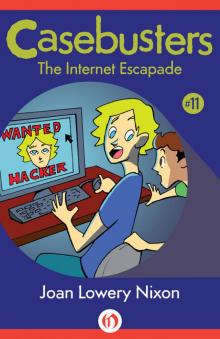 The Internet Escapade
The Internet Escapade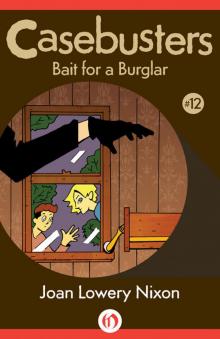 Bait for a Burglar
Bait for a Burglar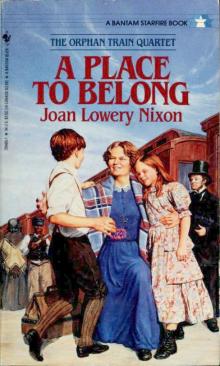 A Place to Belong
A Place to Belong Nightmare
Nightmare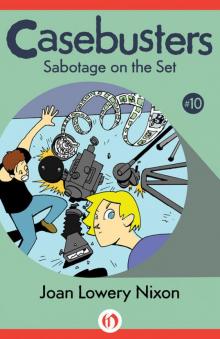 Sabotage on the Set
Sabotage on the Set The Other Side of Dark
The Other Side of Dark Whispers from the Dead
Whispers from the Dead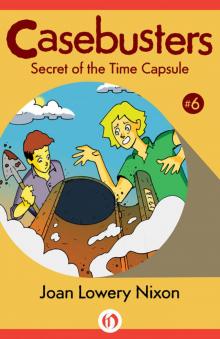 Secret of the Time Capsule
Secret of the Time Capsule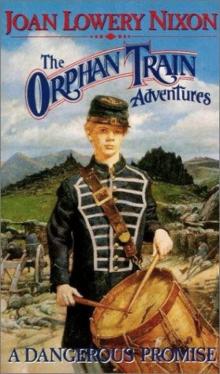 A Dangerous Promise
A Dangerous Promise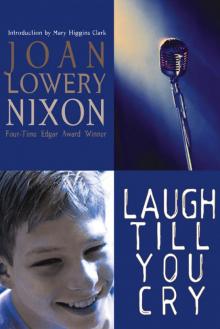 Laugh Till You Cry
Laugh Till You Cry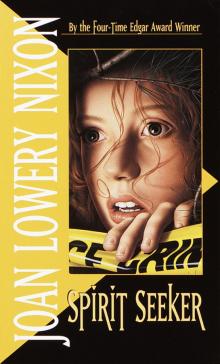 Spirit Seeker
Spirit Seeker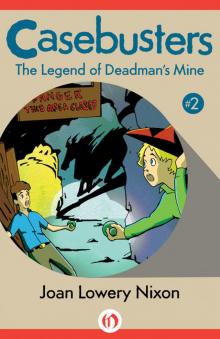 The Legend of Deadman's Mine
The Legend of Deadman's Mine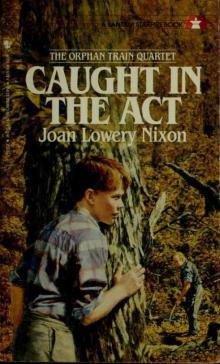 Caught in the Act
Caught in the Act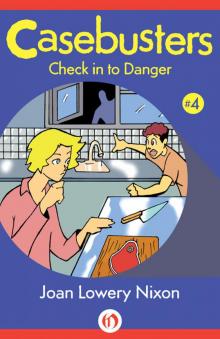 Check in to Danger
Check in to Danger Ellis Island: Three Novels
Ellis Island: Three Novels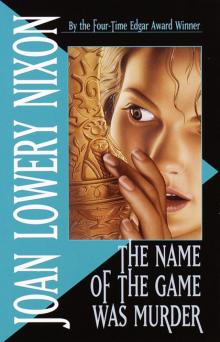 The Name of the Game Was Murder
The Name of the Game Was Murder The Haunting
The Haunting Lucy’s Wish
Lucy’s Wish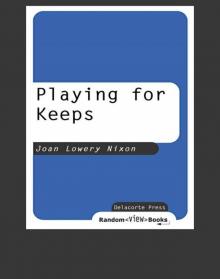 Playing for Keeps
Playing for Keeps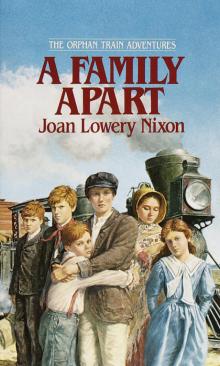 A Family Apart
A Family Apart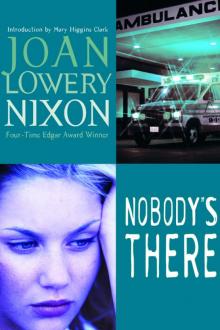 Nobody's There
Nobody's There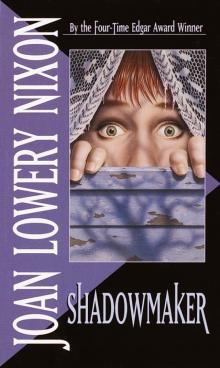 Shadowmaker
Shadowmaker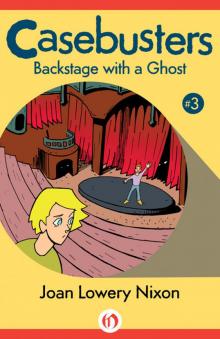 Backstage with a Ghost
Backstage with a Ghost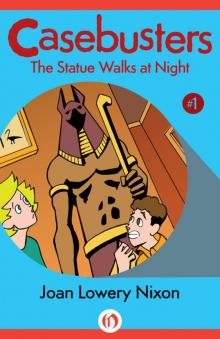 The Statue Walks at Night
The Statue Walks at Night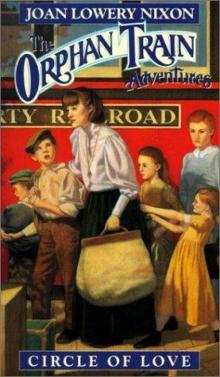 Circle of Love
Circle of Love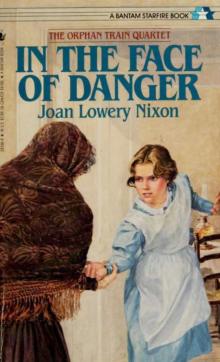 In the Face of Danger
In the Face of Danger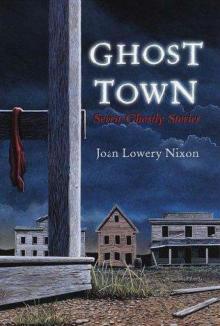 Ghost Town
Ghost Town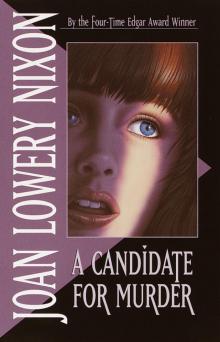 A Candidate for Murder
A Candidate for Murder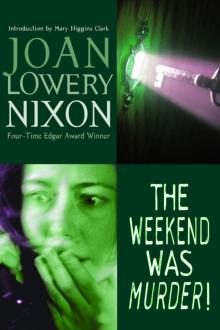 The Weekend Was Murder
The Weekend Was Murder The Island of Dangerous Dreams
The Island of Dangerous Dreams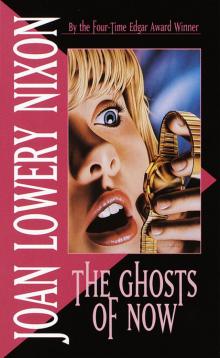 The Ghosts of Now
The Ghosts of Now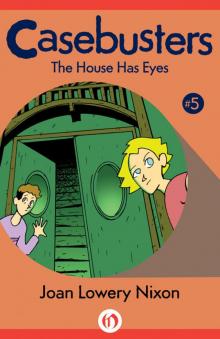 The House Has Eyes
The House Has Eyes The Dark and Deadly Pool
The Dark and Deadly Pool Keeping Secrets
Keeping Secrets Secret, Silent Screams
Secret, Silent Screams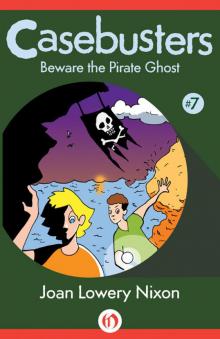 Beware the Pirate Ghost
Beware the Pirate Ghost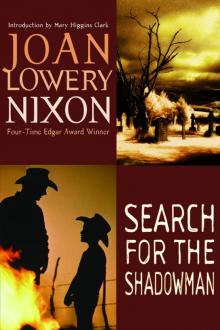 Search for the Shadowman
Search for the Shadowman Haunted Island
Haunted Island